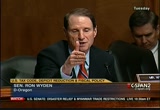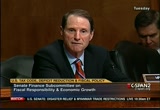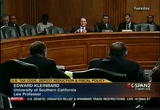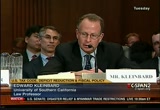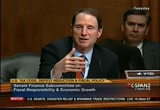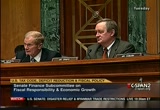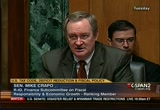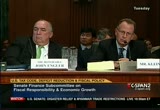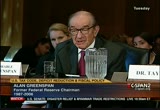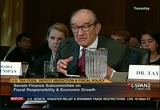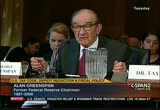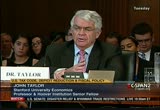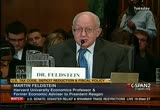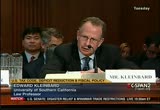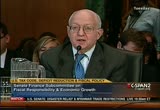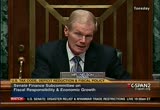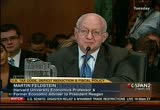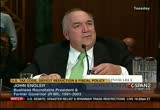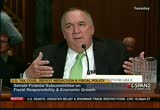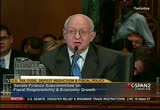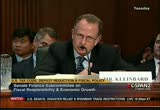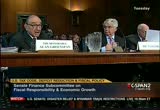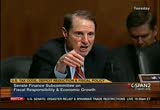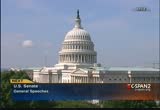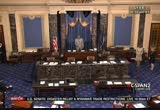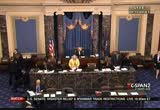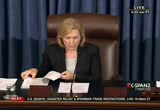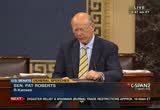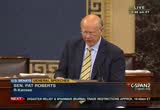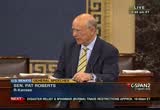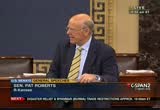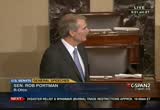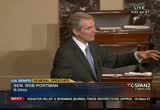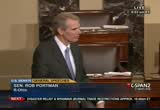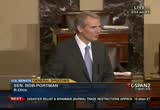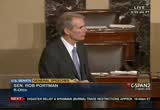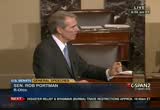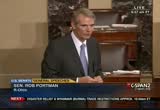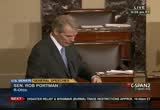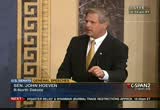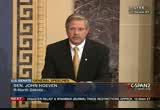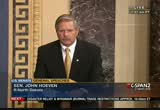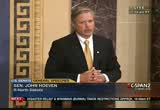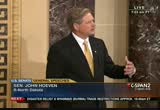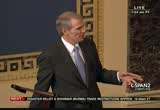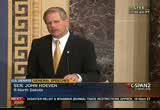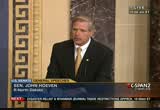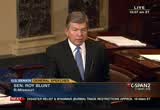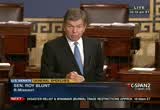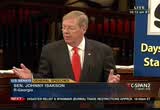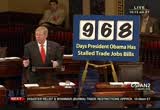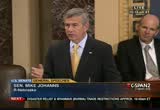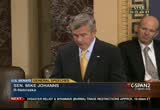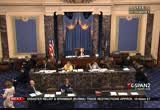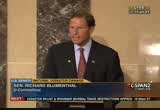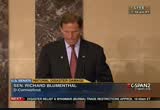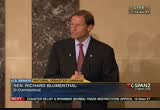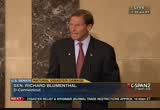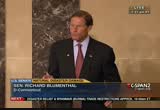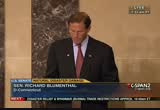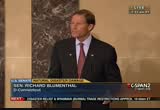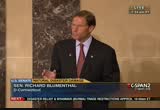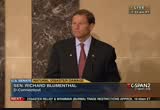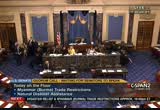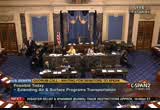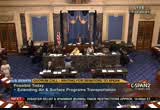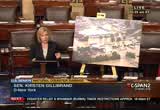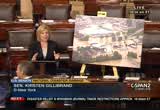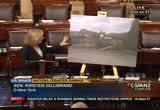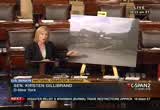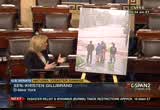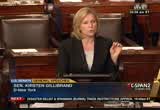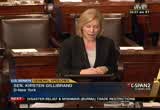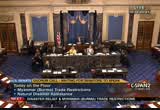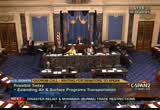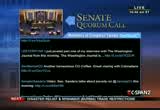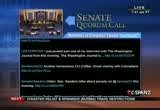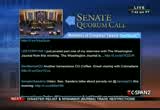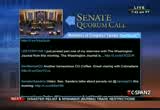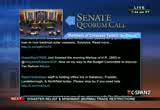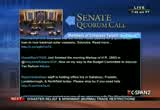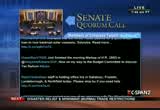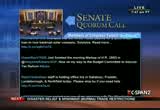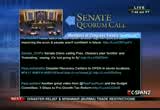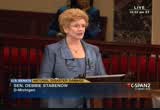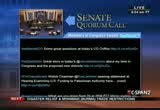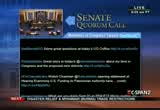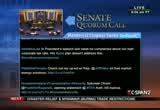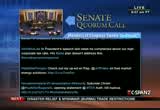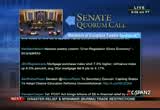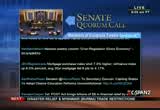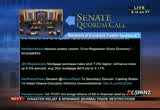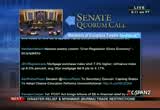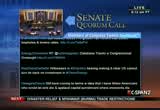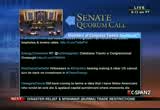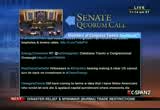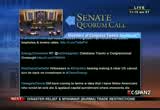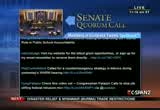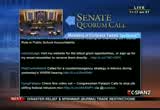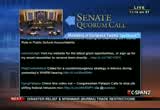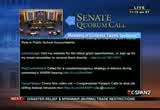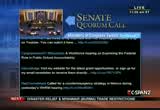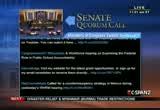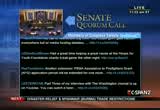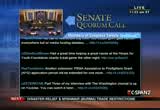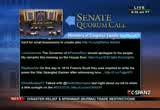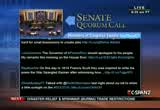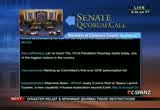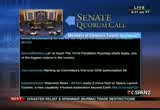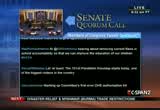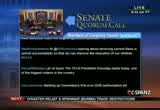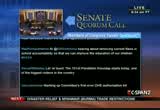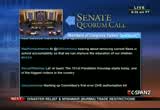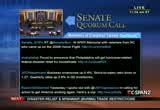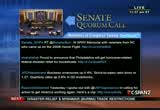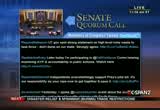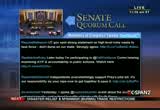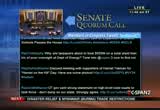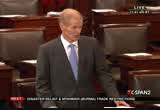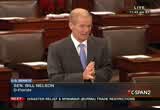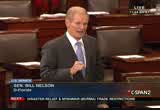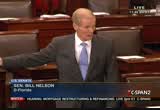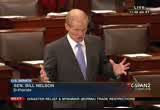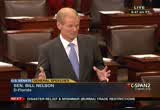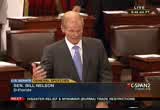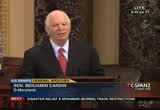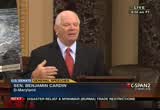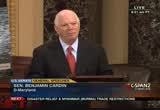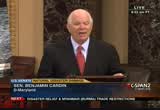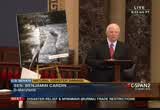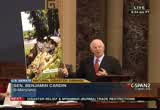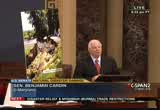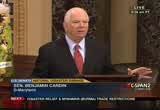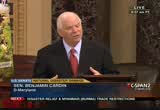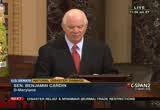tv U.S. Senate CSPAN September 14, 2011 9:00am-12:00pm EDT
9:00 am
but i think from the competitive standpoint it just makes no sense for me, if i might just finish this thought, to have a system -- a german company headquartered, a u.s. company headquartered, we both sell in company. the german company pays whatever tax in china and they take the money. the u.s. company pays the china tax and they leave the money there and they pay another tax. why wouldn't we want the money to come home just on the off-chance we might spend it here once it gets here? >> my time is up. i think you make -- make an important point with respect to the example. i made the judgment with senator coats that if we're going to a permanent tax reform change, it does make sense to have some sort of one time repatriation so that you make it attractive for people to bring that amount home. i just think that as we get into this, as was done in '86 -- and
9:01 am
that's what i was alluding to with respect to your analysis is that democrats who are plenty liberal and ronald reagan made a judgment that competitive rates plus progressivity solved a lot of problems and dr. feldstein, confirmed my thinking that still, you know, makes sense and beyond that i'm very open to working with your organization and others with respect to what those, you know, rates ought to be at 24. senator coats and i have the only bill -- the only bill that's been scored with the lowest rate on offer. it may not be the right one and we're prepared to work with you to get the right one but what dr. feldstein found in 1986 is accept these principles that have been proven to create jobs. and proven to create jobs in the united states which is what mr. kleinbard has said eloquently >> i know i'm out of time as
9:02 am
well but if i can finish my thoughts and take my example and stretch it a little bit further. we used to have an investment tax credit in this country say 10% credit. we now in effect with the way territorial works with my little example with the german company and the china money and the german money come here and buy something here and we take our money here we first take a hit, a tax hit on that before we can make the purchase, thus, that's why clydesdales get bought by them. >> well, you know, this is a very difficult issue and i spent two years working on this very issue. i agree with governor engler, we want the money to come home. we don't want a system that has $1.4 trillion of money trapped overseas as is the case today. that's silly. the current system is silly in
9:03 am
that respect. there's two systems one is the territorial system and the other is the inbev system. if you were to reduce tax rates to 24%, well, from memory, and i may be wrong here but from memory china's tax rate is 25% so the worldwide tax consolidation would add no burden to a united states firm doing business in china. the trouble with the territorial system is not the theory but the practice. and, in fact, when you start looking at what sophisticated territorial countries like germany have done they imposed all sorts of limitations, for example, on the deductibility of interest all over the world including the parent company in germany that the member firms, the business round table, would find extremely distressing. so a well designed territorial system that's robust the gaming
9:04 am
would, in fact, raise revenue compared to current law in ways that -- you know, that would be viewed as troublesome to multinational firms. >> mr. chairman, my time is up. and i just want understood my goal is to reconcile, you know, these two viewpoints. i think it will be necessary to pass a bill. i can recall a conversation i recently had with a ceo who said, i really like your bill. i love the fact that you and coats are doing it. if you get the corporate rate run down to 21%, we're on board. and i said, well, gosh, i'm not in charge of this. chairman bachus is in charge. the president of the united states, you know, is in charge and we're going to have to have a lot of negotiations with respect to trying to find that sweet spot where we can be competitive and create family wage jobs in this country. i think maybe you know this off the top of your head, mr. kleinbard, singapore has a
9:05 am
rate of 10%? >> it's something in that neighborhood, yes, sir. >> so businesses come to me and say we're not going to get the rate down, you know, to 10% but we can walk out of this, you know, debate with a competitive rate and then get to where you just describe, mr. engler which semblance of predictability so you can plan because that's what i found is just get away from th this. if we don't get the cooperation that chairman crapo is talking about we will have a lame duck session and it's just the lame duck session in 2010. we'll have a dysfunctional broken system rather than getting the family wage jobs that these outstanding witnesses would have. so i'd really encourage the work of you chairman nelson and
9:06 am
senator crapo. >> this is clearly a moment in time in which we could get something done with the super committee. senator crapo? >> well, thank you, mr. chairman. i appreciate you letting me go out of next and out of order because i have to run into another engagement but with this group of experts present i can't resist asking this one last question. there's been a lot of discussion by every one of the panel that we have to get our deficit under control. and that, you know, we may have some differences among us as to what portion of that problem relates to overspending versus the tax code or what have you. but we now have a special committee operating. and it's working to get about $1.2 trillion minimum of additional deficit reduction from where we have already gone in this congress. i am one of those who believes that is not enough. and the reason i believe that is -- as you know, i served on the bowles-simpson commission. its proposal would have reduced the deficit over 10 years by
9:07 am
about $4.7 trillion leading us out you get there the spending and other policies. the broader picture of how far do we need to get is the question i'm asking. if you took the $4.7 trillion figure and played it out for 10 years assuming congress didn't get around it somehow and that it worked, even after that was all done we had barely just kept our head above water as i understand the facts. meaning that our debt to gdp ratio was about the same as it is today although it hadn't skyrocketed like it will with no action. our national debt was still $12 million or more and the point i'm making is that it seems to me that our nation in terms of setting a targets needs to be looking at somewhere at least in the 4 to $5 trillion neighborhood of deficit reduction now in terms of our plan for the next decade. and i would just like to ask each member of the panel if you could quickly react to that in terms of what you think our target ought to be or how bold
9:08 am
do we need to get in terms of our deficit reduction as we try to work on some of these proposals? >> senator, i think the 4 trillion is a minimum and one of the reasons i believe that is i think that the current services budget projections are not -- the current services projectious of the deficit are too low. and there is a tendency and anybody who does budget analysis in government to be optimistic. and the problem is, it doesn't work out that way all the time. i'm just taking a second to comment on this issue of uncertainty. one of the measures that i find very riveting is the fact that currently if you look at nonfinancial corporations in the united states, usually they will spend approximately what their
9:09 am
cash flow is. today, they are at the lowest level of investment in long-term illiquid assets of any time relative to cash flow since 1940. the whole level of uncertainty is also reflected in equity prices in the sense that the equity premium which is a measure of the extent of what the -- those who issue stock require in order to sell an issue, that equity premium according to jp morgan is the highest in 50 years so that the level of uncertainty is deep. it's partly related to a tax issue and especially the permanence issue because you can almost argue that it's the impermanence of the tax code
9:10 am
which creates degrees of uncertainty which makes investment in 20-year assets very difficult to do. i mean, i used -- before i was in government, i served innumerable corporate boards in which i was involved in making projections of long-term capital investment procedures and i will tell you that the degree of stability of long-term text expectations played a very important role, not in the average expected rate of return on the particular investment but its variance. and once you start putting variance on a number of these investments, the risk premiums become prohibitive so i think a focus of this committee and indeed the whole process has got to be for once and for all, let us get a structure of taxation which is not constantly subject to change and is not constantly subject to things such as tax
9:11 am
expenditures which are funding every single thing you can think of because it is more difficult to get it through the appropriations process. >> thank you, dr. taylor, what should our target be? >> i originally estimated it should be 6.2 trillion relative to the president's first budget. i think if the joint select committee gets its 1.2, there will still be about 3 trillion left to do. and what i mean by that, the amount -- if it's on the spending side, to take spending to 19.5 percent of gdp. in fact, i would suggest that some of this dialog be transformed back into discussions because these trillions over 10 years are a little much more people out there to really fathom. but the idea of holding our spending -- federal spending to the same level it was in 2007, 19.5% is something most people can understand. and it does add to the certainty. i'd recommend that. but there is a long way to go.
9:12 am
on this uncertainty predictability permanence, i mean, two years ago, over two years ago, when the case is being made for temporary targeted timely tax cuts -- i testified in the budget committee who said, no, we need permanent predictable pervasive tax cuts and creating a little joking about illiteration but that's what we had come to and you have articulated, senator, i think the other position is important to remember. >> thank you, i know i'm out of time but if the three of you could quickly respond, i would appreciate it. >> firm correctly the cbo number is that if we're on a course now which would take us to about a 90% debt to gdp ratio, i think a reasonable goal would be to get it down to 60% and stabilize it there. it would be better to have it lower. but doing that requires taking out 30% of gdp over this period
9:13 am
of time, and that means roughly $6 trillion of less debt than is currently projected. and then you would have to -- in order to stabilize it at 6%, you'd need to get the budget deficit down to about 3% on an annual basis. >> thank you. >> i would just say the employers rate do their part to try to get the growth rate up a little bit that if we're going to have a 9.2% unemployment rate, 1% unemployment rate to gdp, it can't hardly get to 2% we can't cut enough and we can probably get ourselves out of the hole in the horizon. >> thank you, mr. kleinbard you get the last word on this question. >> well, you know, cbo estimates that deficits at 2021 would run in the neighborhood of 1.5 percent of gdp. and that is, you know, i think that is in the ballpark of where we need to be.
9:14 am
the trouble is that in doing that, cbo assumes the expiration not just of the individual tax cuts but also all the business extenders and when you add that all up cbo is assuming $5.5 trillion more in tax revenue than we're collecting today. what's more, and this is a point that i take chairman greenspan to have been emphasizing, the cbo also assumes constant growth. there are no hiccups in the cbo baseline. and so if you want to build in a rainy day fund on top of that, you're, unfortunately, talking about some number compared to current policy in excess of $6 trillion. >> thank you. >> dr. feldstein, what do you recommend that we do with the bush tax cuts? >> tell me what the economy is going to be like, i'm afraid the
9:15 am
economy is going to be very weak. and, therefore, when i think about deficit reduction and reform, i think that we have to do the timing such that we don't take a weak economy and push it down even more. i think there's, unfortunately, contrary to a lot of the both private and public official forecasts, i think that there's a 50% or better chance that we're going to go into a new recession. i think consumers and businesses are not under current circumstances inclined to spend. and so i'm afraid that if that's where we are, it would be a mistake to let those tax cuts lapse. >> anybody on the panel, i would
9:16 am
like you to opine on this -- do you have any favorites among the tax expenditures that you would like to get rid of? that you particularly think are a drag on the economy? and that -- where we can get the most effect in helping not only the deficit situation but the overall economy by eliminating that particular tax expenditure? >> if you want me to just list one, the obvious one is ethanol, which is from -- to an agricultural economist, i think would make a good deal of sense, getting rid of that. it strikes me that we have an impossible problem of a sluggish economy and the need to get more revenues.
9:17 am
i do think we ought to keep in mind the studies that have been made with respect to reducing the problems of excess of say fiscal problems over the years. most who study this issue, including the imf and a lot of academics have come to the conclusion that, yes, an increase in taxes is a possible solution does contract economic activity. and also a cut in spending does but nowhere near as much. in fact, i think the actual -- the actual verbiage that the imf used was that the decline in -- the decline in gdp as a consequence of a reduction in spending was not significant in a statistical sense. and so i think we have to recognize that raising taxes is a problem. if somebody could say to me that
9:18 am
we will cut spending by the amount of the bush tax cuts, i would say that is great because, remember, that the issue of the bush tax cuts is not that they're sacrosanct in any respect but that if we go back to where we were before they were enacted, and, in fact, their enactment in my judgment was mistaken because there was a judgment there that the surpluses were going to continue indefinitely. and, in fact, they stopped in the third quarter of 2001 and dealing with that sort of thing, you realize that you have a very tough decision to make. if we could find a way to cut spending enough to allow the tax cuts to go up, either to prevent the tax cut from going up, that's the best of all possible
9:19 am
solutions. but in my judgment, as bad as the problems are, i think they would be worse if we find as a consequence of this very sluggish period we're going to end up with 110% of debt to gdp or something like that, which is going to be very difficult to pare because paring is not simple when you're dealing with entitlements. you can't cut them in the way you can cut other spending. it's going to be a very tough road to hoe. so my judgment is, let us -- i grant you that the tax cuts to lapse overnight would be more than i wish the economy to be taking but at least to put in place a phased-in program at the same time trying to cut -- to really understand that the purpose of taxation as i said
9:20 am
before is to fund spending and unless and until we get spending down, all of the discussion of the appropriate level of taxation is irrelevant. >> anybody else with a favorite tax expenditure? >> i would just make a point that follows what alan was saying. the studies that show that cutting spending is less contractionary or not contractionary at all relative to raising taxes. generally, those tax increases are increases in marginal tax rates or increases in business taxes, very different from reducing tax expenditures. so i've asked the authors of these studies, do they have an answer? does a tax expenditure reduction have the macroeconomic effect of a spending cut?
9:21 am
or the macroeconomic effects of a tax increase of traditional sort raising tax rates and they say we just don't have the experience to answer that, but my hunch is that eliminating tax expenditures doesn't have the same kind of adverse effect because it doesn't hurt incentive. >> the only thing i could fall back on a little bit is some of the experience i had as a governor where we at the time i became governor in michigan had some taxes that other states didn't. and we had a study done and one of the things it showed pretty clearly is that people were mobile. and we were losing people. and i think there's been some evidence lately in other states where tax increases have resulted in the relocation, the taxes on certain classes of people or income levels or whatever resulted actually in less revenue as they relocated residences to other states.
9:22 am
my good oregon constituent is now a las vegas resident. apparently the legislature did a little tax changes in senator wyden's state. i think on the tax expenditure side we're kind of presenting unprecedented testimony today to say, look, let's put them all on the table but let's use them to achieve what, again, senator wyden mentioned, get that rate low. if you start losing these and i think the finance committee has got, you know -- we're counting you to be the champion to fight the poaching of these by other spenders or other interests around the congress who haven't studied the issue the way you have, but you've got to protect them in order, i think, to drive the rate down. if you lose them you can't go as low with the rate and then you get a lot of different distortion. and i think unequal effects. none of these tax expenditures got here by themselves. they were voted in because somebody was persuaded they were
9:23 am
a good policy decision at the time but now we're saying, let's all come to the table, put everything on the table and see if we can just flat out get a permanent, more competitive structure. and i think that's an interesting conversation and i applaud you for holding the hearing. >> it seems to me there's a lot of agreement uniformed, that the focus of reducing spending growth should be the highest priority. chairman greenspan indicated you shouldn't worry too much about going too far with that. but, you know, even the proposal i laid out which takes spending to 19.5% of gdp -- spending keeps growing. i mean, there is no cuts in the sense of the federal budget keeps growing. and so i don't think it's a problem to -- it's not draconian. it's not austerity. it's just something i think the american people want to have happen. so the highest priority it seems
9:24 am
to me is to -- is to do what chairman greenspan would like to do and seems skeptical about the reality of it and in the meantime the 1986 tax reform, revenue neutral, lowering rates to stimulate growth is really what the aim should be? >> at the same time, you've got to have a tax code that people consider to be fair. any other comment about tax expenditures here? >> i would not eliminate the so-called tax expenditures for savings and investment. we talked about that. and similarly, i wouldn't eliminate it for charitable contributions. the proposal to -- the president's proposal to limit the charitable deduction to 28% marginal tax rate -- i did a calculation based on the extensive research that's been
9:25 am
done on how charitable giving responds to the cost of giving to the taxpayer, and, yes, the government would get additional revenue by putting that cap on, but basically every dollar that the government got came from the charities. that the taxpayers wouldn't have any less money available to spend on other things because they would cut back their charitable giving by an equal amount. that strikes me as a bad one to change because unlike a lot of other tax expenditures which distort spending in a bad way, i put the charitable contribution along with saving and investment as something that we as a country ought to be in favor of. >> i would -- thank you, senator. i would -- i just i want to reiterate the point that dr. feldstein made in his earlier comments that not all tax increases are the same. and, in fact, some tax increases are spending cuts.
9:26 am
that's the whole point of this tax expenditure discussion. so, yes, we need to cut spending but the way to cut spending is through eliminating tax expenditures and as dr. feldstein said, it's just an accident of accounting that we call that a tax increase. the personal itemized deductions are not going to change behavior, eliminating those will not change beat the same way as marginal rates will. i keep coming back to the idea for better and worse and i am sympathetic to the charitable contribution, for better or worse they need to be eliminated as a way with doing the least amount of damage to economic incentives to raise the revenues sufficient to support the spending path that we're already embarked on. >> chairman greenspan? >> there's one issue that i think needs to be addressed on this whole question of tax
9:27 am
expenditures. the experience following the 1986 tax legislation was very dispiriting because i recall elaborate discussions with respect to bringing the marginal tax and expand the base and bring marginal tax rate down and it was achieved in the 1986 bill. the problem is almost immediate we began to erode that process and so there's something inherent in our political process which means that we need two things. one, get rid of a lot of issues of tax expenditures and other such things and broaden the base but find a legislative vehicle which prevents it from eroding thereafter because if you have the same processes that were
9:28 am
going that existed post-1986, we may solve the problem now and find out we're back in 10, 15 years having another cut at this problem. >> you recall at the outset i mentioned how many new tax expenditures had been enacted since the 1986 -- >> as i recall, mr. chairman, it didn't take very many days for a number of those things to come back in place merely because it was so easy to get them through because they were relatively small and no one recognized what they really were. >> senator wyden? >> i had nothing else although i just wanted to say i very much share your views on that last point, dr. greenspan. i mean, no current congress can ever totally bind a future congress, but we sure can find
9:29 am
some hoops that anybody who wants to unravel tax reform would have to go through once you get it passed and there's been a lot of work done looking at some of those possibilities. and any ideas that you, the panel members, would be very much appreciated. there's been a study that there's one change for every working day, you know, year in, year out which gets to the question that i asked governor engler and you touched on very thoughtfully which the the impermanence of it all. i think this is been an excellent hearing, mr. chairman. i've probably gone into as about -- >> just a couple minutes left in this program. you can see it in its entirety on our website c-span.org. look for the c-span video library. we're going live now this morning to the u.s. capitol as the senate is about to gavel in. today on the floor we expect
9:30 am
senators to continue working on a bill renewing trade restrictions against mean mar also known as burma. majority leader reid plans to attach disaster assistance funding to that measure. and legislation to extend programs and funding structures for the federal aviation administration along with some surface transportation programs, current faa authorization expires on friday. this is live senate coverage right now on c-span2. the presiding officer: the senate will come to order. the chaplain, dr. barry black, will lead the senate in prayer.
9:31 am
the chaplain: let us pray. as we come into your presence today, o lord, we, like isaiah of old need to be cleansed from our sinfulness. forgive us for our failures and cleanse us from all unrighteousness. today use our lawmakers so that their actions will help provide for the security and well being of all people. sustain our senators with the protection of your providence and give them your peace. give them also a spirit of unity and the wisdom
9:32 am
to have respect one for the other. lord, thank you for the redemption you provide for your people. holy and awesome is your name. amen. the presiding officer: please join me in reciting the pledge of allegiance i pledge allegiance to the flag of the united states of america and to the republic for which it stands, one nation under god, indivisible, with liberty and justice for all. the presiding officer: the clerk will read a communication to the senate. the clerk: washington d.c., september 14, 2011. to the senate: under the provisions of rule 1,
9:33 am
paragraph 3, of the standing rus of the senate, i hereby appointe honorable kirsten e. gillibrand, a senator from the state of new york, to perform the duties of the chair. signed: daniel k. inouye, president pro tempore. the presiding officer: the majority leader. mr. reid: republicans will control the first half and the majority will control the final half. following morning business the senate will resume consideration of the motion to proceed to h.j. res. 66, which is now a resolution regarding burma sanctions and the legislative vehicle for fema funding. we expect to begin consideration of this legislation today. we also hope to consider f.a.a. and highway extension which we received from the house yesterday. senators will be notified when votes are scheduled. madam president, the house sent us a package, and i appreciate that very much. it funds the highway bill for six months. it funds the fema bill for four
9:34 am
months. that's terrific. now we should move to this just as quickly as we can. however, we're told this is going to be held up by the republicans. if someone wants to have a vote on an amendment that relates to this, i'll be happy to discuss this with the republican leader to see if we can work something out. in the instance i'm talking about, however, the senator says he doesn't want to vote. he just wants to hold the bill up. he said if we put in the, what we got from the house and stuck his provision in that, i think he would be happy. i guess anyone would, madam president. it's a pretty good way to legislate around here, be a dictator and say either take this or leave it that. isn't how things work around here. we have to have votes on issues to find out how people feel. i'm convinced his issue would lose overwhelmingly. but he's holding this legislation up, and we are in a
9:35 am
position now legislatively that i can't get to this bill. we cannot get to this bill prior to friday when the f.a.a. expires. so it's unfortunate that's the position we're in. one senator is holding this up, and what it will do is the highway bill does not expire on friday. f.a.a. does. but they're a package. and if this continues, we will have about 80,000 people out of work by saturday. 4,000 work for the f.a.a., and about 70,000 or 75,000 that are working on airport construction jobs. in las vegas, for example, there is a new tower being built because of the mccaren field being overwhelmed -- the old tower can't handle things well. those people will be laid off. that's the way it is all over the country. that's very, very unfortunate. we are and i really appreciate,
9:36 am
madam president, and i've tried to say individually, i've been to each republican senator, but the senators have voted to help us move forward for funding for fema, i really appreciate it. as you know, we have a majority but it's not a huge majority, and we always need to get things done on issues that are specialized, we need seven republicans, and we got eight republicans in this instance that helped us pass this legislation. all the democratic senators voted for this, and we got those republicans. this allows us now to fund fema. i have told my friends on the other side, the republican side of the aisle that if they want to change the numbers around, let's have a discussion on that. but right now people are desperate. last night about 6:00 or 6:30 i spoke to the man that's in charge of the federal -- i'm
9:37 am
sorry -- in charge of fema and he said we're spending money every day on lee and on irene. these are not a couple women. one's a tropical storm and the other is a hurricane. they are not spending money other places. why? because they don't have the money. as the presiding officer knows, there are people in her state who have lost their homes. this is all up and down the aisle. i'm sorry. the coast, from the coast of florida up to maine and places even inward, as we talked about yesterday. some of the real severe damage was not on the coastline, but, for example, in the state of vermont the worst storm likely they've ever had, and those people are trying to get from one place to the next. they have bridges, scores of bridges that are inoperable. that money, what money they have left in fema will run out, i
9:38 am
think -- he said on the 25th if things keep running the way they are. on the 25th of this month they will have no money. we need to get this done, but procedurally we're on this. i can't move to the highway bill and the f.a.a. bill -- and i repeat, the f.a.a. bill expires. so i hope that we can have something worked out with this senator that we can get this bill done. the disasters facing this country are untoward. 38 states have had emergency declarations. some states sr-ld multiple emergency -- have had multiple declarations. only west virginia and virginia have not had emergency declarations. we've had in the state of texas, an example, 20,000 fires since the first of the year. sunday alone, 19 fires.
9:39 am
millions of acres were burned. 2,000 homes burned to the ground. that's what fema is all about. fema is an organization that's relatively new, but, madam president, we have been helping people as a country who have had disasters since we've been a country. in the early 1800's, -- let's see when that was -- there was a big fire in the state of new hampshire. the date, i believe, was 1813. the federal government stepped in to help with the rebuilding there. that's the way it should be. that's what our country is all about. and we shouldn't -- i'm sorry, madam president. it was 1803. 1803 the federal government played a role in rebuilding after a calamity in new hampshire. congress passed legislation that
9:40 am
year to help new hampshire recover from the devastating fire they had. fema was established in 1979. to this point it appears this could very likely be the worst disaster year in the history of the country. irene alone is one of the five-worst disasters monetarily that we've had in this country. so i would hope that my republican colleagues would work with us and help us move these things along. it's important we do this. it's important we do it as quickly as we can so that people in joplin, missouri, and other places in the country who have been devastated receive help from the federal government that they deserve. would the chair announce the business for the day. the presiding officer: under the previous order, the leadership time is reserved. under the previous order, the senate will be in morning business for one hour with the senators permitted to speak therein for up to ten minutes each, with the time equally divided and controlled between the two leaders or their
9:41 am
designees, with the republicans controlling the first half and the majority controlling the final half. mr. reid: madam president? the presiding officer: the majority leader. mr. reid: there are three bills at the desk due for second reading. the presiding officer: the clerk will read the titles of the bills, the second reading en bloc. the clerk: s. 1549, a bill to provide tax relief for american workers and businesses and so forth. h.r. 2832, an act to extend the generalized system of preferences and for other purposes. h.r. 2887, an act to provide an extension of surface and air transportation programs and for other purposes. mr. reid: madam president, i'd object to any further proceedings with respect to these three bills. the presiding officer: objection is heard. the bills will be placed on the calendar.
9:42 am
a senator: madam president? the presiding officer: the senator from the senator from nebraska. mr. johanns: madam president, are we in quorum call? the presiding officer: not yet. mr. johanns: madam president, i ask unanimous consent that we be allowed to engage in a colloquy with my republican colleagues, senators roberts,
9:43 am
portman, hoeven, blunt and isakson, and in the event the minority leader does appear to offer comments that we interrupt our colloquy for the minority leader to speak. the presiding officer: without objection. mr. johanns: madam president, i rise today with my colleagues to talk about trade and the importance of trade, and specifically, to talk about three pending trade agreements. when i say pending, man alive, am i emphasizing pending. these agreements have been around a very long time. and i'm referring to korea, panama, and colombia. we all know the benefits of trade in the united states. in nebraska, my home state, more than 19,000 jobs and more than 5.5 billion dollars in revenue were directly tied to exports
9:44 am
last year. we often hear in trade discussions about the need to level the playing field. well, these agreements do exactly that. they eliminate tariffs and a whole host of other barriers on most agricultural products, including products that are important to, again to my state: beef, pork, soybeans and corn. no doubt about it, they increase the opportunities, the economic opportunities for nebraska farmers and ranchers, for businesses and for workers. well, for three years we've heard the president say the right thing. in fact, every time he would say something about this, i thought, finally the trade agreements are going to bust loose and we're going to have an opportunity to vote on them. he said it at last year's state of the union -- quote -- "if america sits on the sidelines while other nations sign trade
9:45 am
deals, we will lose a chance to create jobs on our shores." unquote. then again in may the president called for quote a robust, forward-looking agenda that emphasizes exports and democratic job growth. just last week the president noted now is the time, he said "a series of trade agreements that would make it easier for american companies to sell their products in panama, colombia, and south korea." now is the time. well, if now is the time, why is the administration continuing to fail to act? it's been 1,538 days since the korea agreement was signed. it's been 1,540 days since the panama agreement was signed. and it's been 1,758 days since we completed negotiations with
9:46 am
colombia. as i said, i have colleagues with me today that are in a much better position than i would be to explain the impacts, the positive impacts of these trade agreements and so i am going to ask that senator roberts speak first, senator portman, senator hoeven, senator blunt, and senator isakson, and it is my hope that if there is time permitting i will wrap up. senator roberts, please, as the ranking member, former chairman of the house ag committee, ranking member of the senate ag committee 25, how important are these agreements to agricultural -- agriculture and job creation this the united states? mr. roberts: madam president, i thank my colleague and dear friend nebraska for the question. in the end, the biggest
9:47 am
consequence for inaction is the number one -- that is now facing our nation, our biggest challenge, it's called jobs. in regards to his question, the three pending trade agreements add up to $13 billion, $13 billion. in additional exports and an estimated 250,000 jobs. from the ag perspective, the three pending trade agreements represent $2.5 billion if they are ever implemented. the estimates are that the three agreements in total are expected to increase the direct exports by $129.5 million just for kansas farmers and ranchers, and an additional 1,150 jobs for our state. for the folks on the farm, why these export markets are absolutely critical, approximately one-third of our
9:48 am
crop production is exported, for wheat that number jumps to one half. the administration's prolonged delay is causing u.s. businesses and producers to simply lose market share. we're losing out. other countries are not waiting. they are enacting trade agreements without the united states. let me give you a real good example. the colombia-canada trade agreement went into force on august 15 of this year, already the largest food processor in colombia has announced it will source all -- all -- all of their wheat from canada to take advantage of the lower duties. now the canadian wheat will receive from the trade agreement the wheat -- this company's wheat grand alone representatives 50%. kansas farmers stand to lose
9:49 am
$21 million from lost wheat sales alone and $38 million from all ag exports by doing nothing on the trade agreement. soon after the united states negotiated the trade agreement with korea, the european union followed suit in july the korea-european union trade agreement went into effect and according to korean customs within the first 29 days of july, i would tell my friend, the european exports were up 34%. now, get this one. notably, aerospace equipment increased by a whopping 1,693%. that's astounding. well, kansas is a major player in the aviation sector, exporting $2.7 billion in transportation equipment in 2010, last year. as the aviation capital of the world, wichita's aviation companies and 140,000 workers have much to lose in trying to
9:50 am
compete against the european union. it is long, long overdue time for the president to put some action behind his words. send up the three trade agreements to congress immediately. now, i'm going to make a statement that i regret to say. trade assistance notwithstanding, i am very sad to say i don't believe we're going to see any trade agreement this year or the next. and i hope that my prediction is not correct. this is -- this is ridiculous. every third foggy night the president makes a speech and says we need these fraissments we're losing market share. well, i don't see the trade agreements. these aren't the trade agreements. maybe somebody could find them here on the floor of the house. maybe they're somewhere but i think they're in the white house and until we get the politics out of this and the president sends the trade agreements here what on earth is he doing saying we should pass these trade agreements? we don't have the bill. send us the bill, mr.
9:51 am
president. so as the administration delays moving forward on these agreements with korea, with panama and colombia, what's happening to american exports to these important market? senator portman, you're an ex period of time on this. nobody in this senate who is more of an expert on trade. if you apply the administration even metrics, how many jobs will be created -- not talking lost, i'm talking created -- by these pending agreements? mr. portman: first of all, i thank my colleague from kansas who has just made the case eloquently as to why we need to move forward on this. to answer his question, when you apply the metrics that the president of the united states and his administration have used for these three trade agreements loan, they would create 250,000 new jobs. now, by ask my colleagues with 9% unemployment, and continued bad economic news, can't we use those jobs? by the way, jobs that are related to trade tend to be
9:52 am
higher paying, tend to have more benefits. this is exactly what we need to do in this senate, in the house and here in washington is to put the partisanship aside and move forward on things that make sense to create jobs. i can't think of something that would be having a more immediate impact on those exporters you talked about, senator roberts, who right now are seeing their market share eroded because the united states is sitting on its hands. in 2006, the colombian agreement was finalized. now, it's been tinkered with since then, but we're talking five years ago. unbelievable. and what we have sat on our hands and not moved forward with giving our farmers and our workers and our service providers the chance to go into that colombian market, you're exactly right, they've gone ahead and made trade agreements with other folks and colombia is a great example of this. back when we negotiated this agreement and completed it, and i was the u.s. trade rep then as you indicate and i negotiated it
9:53 am
directly with the then president of colombia, president aribe who made lots of concessions including on agriculture, services, at that time we had a 71% market share in terms of exports of agricultural products, wheat, corn and soybeans into colombia. 71% market share. today that market share is about 26%. why? because after we completed our agreement with colombia, they engaged with other countries, including argentina and brazil and now they're buying their products instead from those countries that got their act together, move forward with trade agreements that this president will not get his act together on and send to us. as senator roberts has just said, then just recently this summer, august 15, they completed an agreement with canada. well, guess what the kansas love to -- kansas canadians loves to export, the same kind of wheat we love to export. they're going to take the wheat market away from kansas and north dakota and other states
9:54 am
that need those exports. we have to move forward on this. it's a crime that we haven't been able to provide our farmers, our workers purchase our service providers these opportunities. mr. roberts: would the senator yield for one quick question? mr. portman: absolutely. yes. mr. roberts: you've been there. you've done the negotiating. you know these trade agreements apply not only to exports but to our national security. what has this continued delay and continued delay, what does it do to the credibility of the people who are actually negotiating with trade reps? mr. portman: unfortunately i think some of these countries all three of which are great allies of the united states, panama, colombia, and south korea, feel as though the united states has let them down. now, we're going to move forward here, i believe, i'm more optimistic than the senator from kansas, i believe the president will send these forward. he has to. the logic is difficult to escape. why wouldn't you?
9:55 am
and that's good. and we'll be able to move forward, i hope, with not just opening up more markets but helping on our relationships with these incredibly important allies. in the meantime there has been damage done, you're absolutely right. i think they feel as though in some respects the rug has been pulled out from under them. they made huge concessions and commitments to the united states and politically took great risks, and frankly in colombia and in pan panama where thee moved immediately to ratify the agreements in their legislature it wasn't just the administration, it was the electricity elected representatives of the people as we are who took reu6bgs to say we want to be partners the greatest market on the face of the earth and here we are americaleying them down. it is both commercial impacts on the united states, we've lost market share and jobs because of it but it also has had impacts as senator roberts says, in terms of our standing in the world. that's why we've got to move
9:56 am
forward not just with these three but the important point to made here we have to move forward with additional agreements. there are over 100 trade agreements being negotiated around the world and because the united states does not have trade promotion authority, the ability for the president to bring an agreement for an up-or-down vote we are not engaged in agreements. we are engaged in one regional one, the trans-pacific partnership but none of these bilateral ones where you get new exports and therefore new jobs. this is a bigger issue that must be addressed. this congress will address it i hope in the context of the votes in connection with the trade agreements, we'll promote getting the united states back in the game of expanding our trade and helping u.s. jobs. by the way, you mentioned earlier it's not just that we have the opportunity to create over 200,000 jobs, it's also if we don't move forward on these three agreements the u.s. chamber of commerce has done some analysis showing we would
9:57 am
lose 380,000 jobs. so this sort of ghost ways. there's a cost to not moving forward. and that is also hundreds of thousands of jobs we need in states like ohio and the states represented by the senators who are here on the floor with us today. the international trade commission says these agreements would expand exports by $13 billion, meaning jobs and opportunity. it's time for to us move forward. senator roberts talked about what's happened with the european union which negotiated its agreement after we completed ours. on the auto sector, by the way, there is an e.u.-korean agreement now in place that says the 8 frs tariff on imported cars is being reduced. already starting to be reduced, that's resulting in companies sending u.k. cars including hondas that are produced in the united kingdom are being exported to south korea. we have hoonda plant in ohio and i visited recently. there are 4,200 ohio workers
9:58 am
there. we want to export hondas from ohio to korea and we can do that if we move forward with these dreams. it's time for to us move forward. not the time for us to play politics. we have to move forward because we need these jobs and again, the united states should be at the forefront of these agreements in order to not just protect the market share we have but expand it. 95% of the consumers live outside our borders and we need to access those consumers. i would ask now if i could one of my colleagues to talk a little about his experience in his state, john hoeven was governor of north dakota so he was sort of like the trade representative from north dakota. he was promoting trade as governor and north dakota is a state with a lot of exports including wheat as we talked about earlier. they're being hit by what senator roberts and senator johanns have talked about in terms of what's happening in colombia today with the canadian agreement and the e.u. agreement with korea. i would ask senator johanns if he would talk about why these
9:59 am
agreements are so important to his state to north dakota. mr. be hoeven: i want -- he mr. hoeven: it's good to be here with you, with senator roberts and blunt and senator isakson. coming from our different states we show how important these trade agreements are to our individual states across the country but how important these trade agreements are to our nation right now. when we're talking trade, we're talking jobs. we need to create more jobs in this country and it's the private sector that creates jobs. it's business investment, it's companies that create jobs. our task, our role is to create an environment where our companies and our entrepreneurs with american inge newtty, that built this u.s. economy, we have to create that environment
10:00 am
so they can invest and create those jobs. and one of the important ways we do that is with good trade agreements. let's make sure our companies can export their great products and services all over the world. we have got to compete in a global high-tech economy and these trade agreements help us do it. and that's why it's so important we move them forward. so today we're really here on the floor of the senate saying why don't we have these trade agreements? thursday night we heard from the president that we need to move forward with these trade agreements. we want to move forward with these trade agreements. we're ready to go. we have been for some time. in fact, the senators here on the floor and others have been working very hard to do everything we can to make sure we've cleared the path so that these trade agreements can come to the senate floor. it wasn't too long ago senator johanns, myself, senator portman went with senator mitch
10:01 am
mcconnell and senator moran over to south korea to meet with president li. he wants the agreements. he's ready to go. as a matter of fact, he said please ratify the agreements in your country and get them over to me because i'm ready to take them to my legislators and get this approved. so he's asking for them. second, our president said, well, there's some concerns that we need to deal with as part of these trade agreements. he said we need to address t.a.a., trade assistance adjustment; right? so we said, okay, fine. we'll work with t.a.a. we'll make sure that we have enough senators that are willing to work with t.a.a. so that it's squared away. we've got it covered. that's been communicated. so the question is: why at this point don't we have the trade agreements? that's the question i think that has to be asked. where are they? why aren't they here on the senate floor so we can move forward with them? in our state, as others have mentioned in their states, incredibly important. just a few big stats to follow
10:02 am
along what senator portman mentioned just a minute ago. for every 4% increase in trade, we create a million jobs in this country. for every 4% increase in trade, a million jobs in this country. how important is that? the u.s.-south korea free trade agreement alone, more than a quarter of a million jobs, more than $10 billion in increased u.s. exports to just that country alone. i tell you, i can't think of a time when it's more important to create those jobs than right now when we have more than 14 million out of work and many, many more who are either not looking because they haven't been able to get a job or who are underemployed. unemployment more than 9%. this is one of the ways we create that environment that get our people back to work by empowering the private sector to
10:03 am
make that investment and create those jobs. i was just back in north dakota, and one of the many event that o was an expansion of the caterpillar company's location in west fargo, north dakota. they remanufacture a lot of their equipment in west fargo, north dakota. this equipment goes all over the world. it's part of this huge equipment made used for excavating and mining, all these things all over the world and they are the technology leader in the world in this huge equipment. they bought basyrus. now they're getting into the mining business. getting into places like colombia and panama incredibly important. think of the impact throughout the heartland, in indiana or
10:04 am
illinois. senator roberts talked about agriculture. in north dakota we've got more cattle than people. i think we've got three million cattle. right now to send them into south korea, we pay more than 40% tariff. how do we compete with argentina or australia in that situation? this is an opportunity. this is absolutely an opportunity. we need to reach out and grab it with both hands. we've got the president right now saying hey, pass those trade agreements. absolutely. please get them down here to us. we've worked so hard to make sure we've cleared all the hurdles, t.a.a. or whatever else is required. bring those trade agreements to us. we stand ready to pass them. and with that, i'd like to -- a senator: would you yield for a second? mr. hoeven: yes. a senator: you're talk to go your constituents about this. i'm sure all of us have stories about this. mr. portman: this morning we
10:05 am
had a weekly caucus. there were 12 pork producers from ohio. their number one issue was trade and tkpwregt -- getting these agreements done. they have to have international sales in order to make ends meet, particularly with the price of feed going up, they've got to have these foreign markets. it was just interesting that of all the issues that they could have raised with me, the one they were most concerned about was making sure we get these agreements done and moving forward with additional agreements. again, it is our job to provide, as you said, the environment for success. part of that environment is to give our exporters the ability to have a level playing field to access these markets. they are the best farmers in the world. we have some of the most productive land in the world. they just need a fair shake. mr. hoeven: it's absolutely true. in handing off the ball in this discussion, i want to go back to the trade adjustment assistance which i mentioned earlier. there were a number of things that the administration wanted to see before bringing these
10:06 am
trade agreements forward to us for ratification. senator blunt and senator portman were instrumental, and along with, led by these two, senator johanns, myself, senator isakson and others. we even signed on to a letter actually not once, but i think twice, to make sure we got it right. but senator blunt, your leadership really in making sure that we had taken all the necessary steps so that the administration was prepared and willing to bring these agreements to the senate floor really have been covered. so i thank you for that leadership. and you may want to touch on that. i know how important the trade agreements are to the state of missouri. but also thanks for your leadership, senator portman, your leadership as well in making sure we address t.a.a. and all the issues that needed to be addressed as part of moving forward with these trade
10:07 am
agreements. mr. blunt:i think what the president said we had to have trade assistance. we looked at the negotiated package. it wasn't what any of us who signed that letter would have negotiated. we said, look, these are the jobs that are the low-hanging fruit of job creation if we get these three trade bills. we're willing to look at the baucus camp negotiated t.a.a. and support it, and support it in a way that the white house can sign it and send these agreements up. senator hoeven mentioned as he and i and all of us were sitting in the house chamber last week, thursday night listening to the president's remarks, when he said we need to pass these three trade agreements, i was almost sure the next sentence would be, and so tomorrow i'm sending these trade agreements up. but that next sentence didn't occur. just like the week in august where the president was on his
10:08 am
bus tour, and every single day on the bus tour he said the congress can do something right now that would create more american jobs if they'll pass these three trade agreements. and every time he said that, even though i was hearing it on the tv, i couldn't help but talk back to the television or radio and say we can't pass them unless you send them up. you're absolutely right, mr. president, this is one of the easiest things we can do to create jobs, but we have to have agreements from you before we can vote on them. don't tell the american people that all we have to do is pass the bill when you know that you have to send the bill up before we pass the bill. and we need these three agreements. as senator portman has pointed out, we need more agreements. but that's not really happening right now. we do need the president to have the authority and and i think all of us would be more than willing to give him, but that's not part of this package, the trade promotion authority that we'd like to see extended into
10:09 am
the future. but right now we have three agreements that have been negotiated for a long time. and whether it's the missouri and north dakota beef industry or the missouri and ohio pork industry or these other, or the grain industries that we all are impacted by, there's a real opportunity here, and these markets are waiting for us. just to look at one state, just to look at our state, since 2002, exports have increased more than three times faster than the state domestic product has grown. and so for those who say, well, exports cost american jobs or missouri jobs, they clearly provide those jobs. u.s. farm exports reached an all-time high in 2010, amounting to more than $115 billion in sales. for every $1 billion worth of agricultural exports, it is estimated 8,000 jobs. and so these countries are
10:10 am
waiting for agreements that will increase trade in soybeans, in beef, in corn, in pork, in dairy products. in processed goods, in fact in processed food of all kinds, but we can't get to those markets until we pass these trade agreements. all of us are eager to work with the president and get that done. all of us are eager for him to send those trade agreements up. you know, since these agreements were negotiated, others have negotiated agreements and launched them, and it may have been mentioned already this morning but if it hasn't, it's important to understand that on july 1 the european union trade agreement with south korea went into place, and they had a one-month 38% increase year over year the first month of that trade agreement. the canadian-colombia agreement that went into place on august 15, and having been to colombia and worked on this for some time, there is no question that there is a preference for our goods. but once they start buying these
10:11 am
other products, then you have to convince them, no, you need to come back to the product you would have rather had to start with if that product would have had an even shot at the marketplace. panama negotiating all kinds of work agreements and expansion agreements on the canal that we're disadvantaged in because we haven't passed that agreement. let's get these three agreements done. let's start creating the private-sector jobs that these agreements clearly will lead to. as we have talked to the white house and the president about that, my good friend from georgia, johnny isakson, has been in the middle of all those discussions. we know what can happen here. but for it to happen, we have to get these agreements sooner rather than later. let's get them up here. let's get them passed. let's get them back in the hands of our new trading partners and see these jobs increase. i'm pleased to recognize and encourage the ongoing efforts for this effort of my good friend, mr. isakson.
10:12 am
mr. isakson: thank you, senator blunt. thank you very much, senator johanns, for organizing this colloquy. i represent a state that is the home to the second-largest port on the eastern seaboard of the united states of america. the port is savannah. the poverty savannah directly employs 300,000 people in the southeastern united states. can you think what an impact this is going to have to increase that employment if we get these free trade agreements? let me give you an example that is amazing. south korea surpassed japan in 2010 as the second-largest northeast asian destination for south atlantic exports behind only china. second largest in all of asia behind only china, most of that going out of the poverty stpapb tphafplt senator savannah. we're number one in poultry and
10:13 am
korea is a huge kpwoert -- importer of poultry. south korea's imports from south korea into the united states went up by 26% last year. our exports to them went up by 15%. that's an 11% negative in the trade deficit which causes us tremendous problems. the presiding officer: senator, the time has expired. you could ask for consent. mr. isakson: i'll ask for unanimous consent for five additional minutes to close. and i'll close very quickly. the presiding officer: without objection. mr. isakson: thank you very much, madam president. so my point is very simply this, we can help to balance our trade deficit, we can help to increase employment in the southeastern united states, we can help poultry, pork and beef. it's been 968 days since the president could have sent us these trade agreements and he has not. my point in this debate is very simple, there's one person in
10:14 am
the united states of america standing between us and more job creation, and it's the resident of the white house, president obama. now i'd like to turn it over to the organizer of this event, senator johanns. mr. johanns: madam president, i end my comments today by saying to all of my fellow senators, thank you so very much for coming to the floor today and making the case. there is an old saying in a profession i used to be engaged in: i rest my case. well, after hearing from these fine gentlemen about the importance of these agreements and why we need to have the president send them here, i rest my case. it's going to improve job creation. it is going to improve our opportunity to export our products. it is going to level the playing field. it is going to give our producers the opportunity to reclaim market share that has
10:15 am
been lost while we've been waiting for these agreements to come here. the final point i want to make is this: we come from a state where unemployment is right above 4%. in this recession, unemployment in nebraska never went over 5%. as i was doing my town hall meetings across the state, i had members of my business community coming to me and saying mike, one of the challenges we're facing is finding the workers for the jobs that we are creating. therefore, in my state, trade adjustment assistance would not be the high priority it is in many states. notwithstanding that fact, when senator blunt came to me and said look, the president is insisting on trade adjustment assistance as a condition to move these agreements, will you sign on to a letter that will
10:16 am
back trade adjustment assistance, and i said i would. why? because the trade agreements are important to us. it is my hope that after the many speeches we have all given, the many speeches i have given on the importance of these agreements, not only here on the senate floor but across this country, that the president is listening and will finally send us these agreements so we can work with the president, that we can join arms on these agreements and do everything we can to get the votes in the senate and the house to pass them and put them on his desk and create 250,000 new jobs. madam president, i yield the floor. the presiding officer: the senator from connecticut.
10:17 am
mr. blumenthal: madam president, over the past two weeks i have traveled the state of connecticut much as you have described the state of new york and you have described eloquently the damage have you seen in your state, i've seen much the same in mine. destruction of small businesses, of homes, rivers, swelling, flooding of historic dimensions, causing significant destruction. the wind and rain striking connecticut with a fury, and ferocity virtually unmatched in recent memory. i've met with families and community leaders, farmers and small businesses about the help that they will need to rebuild their homes and their businesses and their lives and their livelihoods. and it is a powerful and moving
10:18 am
struggle. the citizens of connecticut, like the citizens of new york and other communities struck by this storm have reacted with determination and resolve. not with desperation or despair. they are determined and dedicated to rebuild and recover from this storm. but they need help. and that help is provided by fema, and we are here today hopefully in a bipartisan effort to make sure that these communities and others like them throughout the northeast and the united states have the hope and the really consequential aid that they need to make that recovery and rebuilding real in their lives. the early estimates suggest that the damage caused by irene could reach $10 billion, making it one of the 10 costliest disasters in united states
10:19 am
history. and the suffering and real sadness of connecticut citizens gives us a bond and a cause in common with millions of other americans who have suffered from hurricanes, tornadoes, floods, other natural disasters across the country. this year alone we have seen flooding on the mississippi and missouri rivers and other rivers in the midwest, devastating tornadoes in the south and fires in the south and weft, and now hurricane irene and the senator from lee. tropical storm lee. in times of crisis americans rally as neighbors, as a community, regardless of specific states where they live, they come together to
10:20 am
rebuild their homes, to make common cause, to recognize our bonds as a nation, and the spirit of our nation is that we put people above politics every time, without exception. we provide disaster relief for victims, like connecticut residents now with the resources they need to rebuild. currently fema funding disaster relief for over 550 disasters, including 29 in oklahoma, 21 in kentucky, 17 in texas, 19 in mississippi, and 18 in kansas. yet two weeks ago, house majority leader eric cantor stated that relief funds for hurricane irene would need to be offset by savings found
10:21 am
elsewhere in the federal budget. i reject that contention and so should this body and my colleagues from those states that i have just named and all the other states in the union, in fact, all but a handful or less have received and are receiving disaster relief just since january of this year. we need to do everything we can to put connecticut and america back to work, to make sure that our economy moves forward again to create jobs and reduce the deficit. yes, we need to reduce the deficit and the debt, and cut unnecessary and wasteful spending. but we cannot permit washington politics to create a legislative logjam and gridlock that bog down these efforts for disaster
10:22 am
relief. the need is too urgent for thousands of families and businesses in connecticut and around the country that have been devastated by these unprecedented floods and other natural disasters like hurricanes, wildfires, and others. turning disaster assistance into a political football is unacceptable and unconscionable. it is a recipe for gridlock and it's just plain wrong. it's wrong and a disservice to the men and women whose homes and businesses have been hit by the forces of nature that are unpredictable and unpreventable. and now they are attempting to rebuild their lives and we owe it to them to match their courage and rezil ensign -- resilience with efforts from fema.
10:23 am
we can't prevent those hurricanes or tornadoes or wildfires, but we can step forward when these disasters occur and lend a hand to our neighbors as we have done throughout our history. and we can provide these communities with the resources, the real resources they need to recover without distinguishing between them. what state they're in, what part of the country. one story from connecticut i think tells a lot about the choices we face right now in our country. mel goldstein and his wife arlene whose home was completely destroyed by flooding caused by irene are being told that their homeowners' insurance will not cover the damage. their only hope of recovery is fema flood insurance and other fema assistance. right now, they're using their savings to stay in a hotel while
10:24 am
they rebuild their lives. mel is one of the best known weather men in the state of connecticut, he's an icon in the broadcasting world, a hero to many of us for his struggle against cancer. and his treatment in this unstable environment at this point in his recovery adds an unnecessary toll and stress to their lives. just as we have in the past, we must come together to help folks like arlene and mel goldstein to move on after the unthinkable happens in their lives. the unthinkable happened to them, to many of their neighbors in east haven along the shore of connecticut. i've seen their voices and faces throughout our state. in communities big and small, where flooding has put a small business out of business, and
10:25 am
where homes have been destroyed and people are living in shelters or with their neighbors or were for a while. these kinds of human stories are part of the fabric of the larger story that we feed to recognize here -- need to recognize here. and i hope that my colleagues will come together as we did on the vote yesterday to approve this measure. the vote yesterday i think signaled perhaps a return to the bipartisanship that should prevail when the nation confronts crisis and disaster. and our number-one goal, which should be a bipartisan goal, must be to deliver help to our fellow americans as quickly as possible. thank you, madam president,
10:26 am
10:29 am
the presiding officer: the senator from new york. mrs. gillibrand: ask that the quorum call be dispensed with. the presiding officer: without objection. mrs. gillibrand: hurricane irene and tropical storm lee left a trail of devastation across new york state. i saw firsthand the impact they left on our communities, hundreds of families living in shelters, complete homes destroyed, belongings piled up on people's front yards. small businesses, uncertain whether they would even reopen, worry about whether they could hire back their employees. farms who had no feed for livestock for days, crops and livelihoods vanishing without any trace in a single day. crumbling bridges, washed-out roads, heating oil soaking into buildings and the ground. i was born and raised in upstate new york, and i can tell you
10:30 am
we've never seen this kind of devastation, certainly not in my lifetime. america has always stood by those who have suffered greatly from disaster, and we have always helped them to rebuild. we have an obligation to these families, businesses, farmers to help them rebuild today. this picture is of downtown bing hamilton. i met with -- bing ham binghamton. they were on day four at the shelter unclear good they would be able to see what was left of their homes. i can't fully describe the worry and fear in the eyes of parents who are in a shelter with their children. i talked to one mother who has ten children, the youngest of whom was 2 years old, trying desperately just to keep them fed, keep them safe, but literally having no sense of when she could return to her
10:31 am
home and what it would look like when she returned. i talked to one father whose daughter turned 13 years old that day in the shelter, and his worry was mostly i just don't know what's in front of us. i don't know when we'll be able to go home. i don't know how much has been destroyed and i don't know how i will rebuild. one parent that i talked to was a young mother. she held a 6-week infant in her arms. and she just said to me i have everything i need right here. and that really exemplified the courage of americans when they fight through suffering, the strength of new yorkers that they will pull themselves up by their own bootstraps and make the difference. but we here in washington must help. in schoharie county, the main street of the villages of schoharie and middleburg, every single home was flooded.
10:32 am
the watermark was about seven feet and as you drive down the main street and talk to the business owners and the families, you can see there's not one that was left untouched. every piece of these families' belongings are literally on the front lawns of these homes and businesses. but i watched these business owners begin to rebuild. i could see them literally bringing the mud from the basements, bringing the mud from the ground floors, pulling down all of the dry wall because obviously the damage was so great it would cause long lasting damage and people are very worried about how they can make sure that their business is safe. this is just a snapshot right here of the town of middleburg. now, this is the farming community within schoharie county. now, these farmers have lost everything. i can tell you the water was so strong, the surge was so great it literally took trees out of
10:33 am
the ground, completely uprooted and overturned. the crops that you could see on this farm, they were so covered with silt from the river, you couldn't even recognize what kind of crops they were. i saw potatoes that had been uprooted from the ground all over the road. that farmer could salvage nothing of their farm. we had one farmer who came down to meet with me because her cows were stranded. they had 800 cows stuck because the roads had been completely washed out. they had no way to get feed up to those cows, they had no way to deal with manure and dump all the milk that had to be destroyed. they needed a rescue effort. because of the efforts of our governor, he reacted quickly, our national guard got up there, got food and water to the farmers, they fixed the road, the feed was delivered. but this is the kind of reaction we need from government. this is why the federal government must be there to help
10:34 am
and protect these families and businesses. our next picture is of green county. now, green county, waters rushed down the main street. this is a picture of windham, and destroying all businesses in its wake, families, homes, absolute struction destruction throughout green county. i talked to one business owner and she had a business for children's clothing, children's needs, children's toys. she has just a couple of employees but she said i have nothing to rebuild. i have no way that i can rebuild my business. i don't think i could rehire those employees. so the feeling of hopelessness and worry and dread and concern on top of a very tough economy anyway, these are the businesses and families and farmers that we need to help because we need them to rebuild. we need them to have the ability to hire those employees back, to produce food for our
10:35 am
families, to make sure we have thriving communities once again. the last picture i want to show is of keen up in the north country. in keen, the river rose 22 feet above the flood stage, washing out roads and bridges and left much of the town actually stranded for days. half of the town's firehouse was ripped apart and swept away by the river and up in the high peaks, the rain came down so hard that it brought huge chunks of the mountainside with it, creating slides that have changed the face of the adirondacks for generations. as you can see, this is just four communities. throughout new york state, the north country, the capital region, hudson valley, southern tier, long island, no one can question the absolute devastation these storms have left our communities. we must stand with them in their
10:36 am
greatest time of need. federal assistance is essential to help these families, these farmers, these businesses, and communities, not only recover but rebuild and be stronger than they were before. we need immediate funding for fema and the usda disaster relief all across new york and all of the other states that were affected by these storms. mr. president, i would now like to address a second issue that is causing me very grave concern. i'd like to talk for a moment about a piece of legislation that i've introduced with senators kirk and lieberman to toughen the sanctions on syria. syrian president assad has killed over 2,000 of his own people in an alarming torrent of violence from one of the world's most repressive regimes.
10:37 am
2,200 people are estimated to have died so far. assad's aggression against the syrian people is matched by his subversive aggression abroad. his regime is a state sponsor of terrorism, one of iran's closest allies and a key backer of hamas and hezbollah. assad's regime has for years helped foreign firefighters enter iraq and kill our u.s. soldiers. in response to this violent crackdown i introduced the bipartisan syrian sanctions act of 2011 to hold assad's regime accountable. this legislation would block access to the u.s. market for companies that invest in syria's energy sectors, purchasing the country's oil, and selling gasoline to syria. this sanction is critical, since syria's energy sector accounts for one-third of that state's revenue. i ask my colleagues to sponsor s. 1472 and send a clear message
10:38 am
to syria that until the assad regime responds to the democratic urging of its people, halt its nuclear development and ends the support of terrorism, syria will not and should not have access to the global economy. and any company that does business with syria will no longer have access to the global economy. this legislation is clear, it is very simple, that no company should be allowed to put their profits before our national security. mr. president, i yield the floor and suggest the absence of a quorum. the presiding officer: the clerk will call the roll. quorum call:
10:49 am
ms. stabenow: i ask suspension of the quorum call. the presiding officer: morning business is closed. the clerk: motion to proceed to consideration of h.j. res. 66, a joint resolution approving renewal of import restrictions contained this the burmese freedom and democracy act of 2003. ms. stabenow: thank you, madam president. i rise to speak about the need to have a disaster assistance
10:50 am
effort to support those in new york, your state, as well as across the country and the tremendous needs that we have today as a result of what has happened regarding the weather. this year we've seen a terrible string of natural disasters that have shut down businesses, farms, have left families homeless all across our country, and as chair of the agriculture committee, i am particularly focused, of course, on what has happened to our farmers in america. concerned about the flooding along the mississippi and missouri rivers, the record droughts that have devastated the livelihoods of men and women who grow our food all across america. earlier this year, we had the worst droughts in recorded history in oklahoma with about $1.6 billion in crop losses. in kansas, i've had the opportunity and my staff has some join with my ranking
10:51 am
member, my colleague, senator roberts, in talking with folks and having a chance to see the fact that the droughts have wiped out about $2 billion in crops. floods in the mississippi river valley washed over three million acres, three million acres, of farmland. hurricane irene destroyed more than 450,000 acres of cotton, and 300,000 acres of corn in north carolina. in new york, we have seen similar damage to corn, soybeans, alalpha, fruits and vegetables, and in vermont, crop losses are estimated at more than $5 million. all across our country we have serious challenges that are creating hardships for our businesses, farmers and families. we have to respond. that is our responsibility. the droughts are worst in texas
10:52 am
where the damage is in the billions of dollars and more than 1,000 homes have been lost. already this year there have been natural disasters in 48 of hour states. 48 out of 50 states have had natural disasters. michigan, thank goodness, is one of the two states that has not been affected by the weather, but throughout our nation's history when men and women in one part of the country are hit with a natural disaster, all of america comes together to support them and to help rebuild and that's really what this effort is about was coming together as americans. that's who we are as americans, we stand with each other in times of trouble. this is not the time to play politics, madam president. not when hundreds of thousands of families, farmers, businesses have been devastated by an unprecedented string of floods, tornadoes, hurricanes, wildfires, and other natural disasters. already fema has had to halt
10:53 am
rebuilding efforts in 41 states. so they've now had to halt rebuilding efforts in 41 states. so it is critical that we get this done, this legislation in front of us needs to pass and it needs to pass quickly. but i also want to tell you now about another emergency that has taken place in my state, and in too many other states. it's called a jobs emergency. we may not have been affected by the natural disasters of the weather, but as we look over the last decade in a global economy, as the economy has changed, we have been through the same kinds of devastations over a longer period of time, but our people are affected as much as any other state disaster. we have 14 million people out of work in this country. 14 million people out of work.
10:54 am
we have a huge he was national . we'll never get out of work with 14 million people out of work. we have to to make smart decisions on cutting things that aren't important and grow, we have to create jobs for people, support the private sector efforts to create jobs. and for each and every one of those families, their job search is an emergency. it's an emergency every time they think about how to put food on the table. it's an emergency every month when they have to scrape together money for the rent or the mortgage. it's an emergency every minute of every day when those men and women are filling out applications, going to job fairs, trying their best to get back to work. so, madam president, i find in the middle of all of this, in the middle of support for all that is going around in the country in terms of natural
10:55 am
disasters, it is extremely concerning, in fact, outrageous to me that the house republicans have proposed a job-killing offset to pay for the help that's critically needed for natural disasters, that would pull the rug out of businesses and families all across our country and put it up to 50,000 american jobs at risk. that's what they are proposing. and i absolutely oppose this. they propose paying for this critical disaster bill by taking dollars out of a very successful advanced manufacturing retooling program that we passed in the 2007 energy bill, and it took a while to get it up and going, the previous administration never administered it, i want to thank the obama administration for coming in in 2009 and beginning the process of putting it together and all the rules that it took and so
10:56 am
on, so it took a while to get up and going. it has not moved as fast as i would like at all, but thank goodness the obama administration saw it as a priority and has moved forward to put it in place. what has happened already? these retooling loans have meant 41,000 jobs in tennessee, california, indiana, michigan, delaware, illinois, kentucky, ohio, and missouri. these retooling loans have helped companies retool older manufacturing plants to build the products of the future here in america. rather than shipping those jobs overseas. and it's been, as i said, extremely successful. in michigan, retooling loans made it possible for ford motor company to save 1,900 jobs at the michigan assembly plant this the city of wayne so they could
10:57 am
build the all-new ford focus and the battery focus in america and in the process of that, as we partnered with them on battery funding as well, in the process of that with the help of these retooling loans, they are bringing jobs back from mexico to support the work they're doing on the new vehicles. madam president, i don't know how many economic development efforts we capital stand on the floor today and talk about in the united states senate or house that are actually bringing jobs back from overseas. and this is the program that the house republicans want to cut. this loan -- and it is a loan, so it has to be repaid -- but it is allowing them to be able
10:58 am
to have lower costs, to be able to do the retooling on these older plants, to be able to make these new high-tech vehicles and as i said, in ford motor company's case, they have saved 1,900 jobs and are bringing jobs back from mexico. another michigan company, silver star north america was able to secure a retooling loan to retool an old steel mill in michigan into a cutting-edge plant, building advanced high-strength steels or automotive production. jobs here. that doesn't count what's happening in states across america. that alone, along with private loans and a billion-dollar investment from the company, will help create over 2,500 construction jobs and will bring the total number of permanent manufacturing jobs at that plant again to 1,900.
10:59 am
pretty good investment on a loan that's going to be paid back while creating jobs. these are the kinds of things that we need to be doing. we need to be doing to address the jobs emergency that michigan and states all across the country are feeling and have been feeling. right now there are 35,000 to 40,000 jobs at stake in this proposal by the house republicans. we have other companies that want to use the retooling loans to make things in america, in michigan, illinois, indiana, louisiana, and florida. these loans are expected to be approved in the next few months. they're very, very close. and we would see 35,000 to 40,000 jobs disappear, the opportunity for those jobs
11:00 am
disappear if we were to accept the house proposal. in the next round of manufacturing retooling loans after that we could see another 10,000 jobs created across the country. but these, if these retooling loans don't happen, those jobs will not happen either. to add insult to injury, these companies have been working closely with the department of energy in some cases for several years in order to qualify for these loans. they have had top undergo the most rigorous screening to make sure the products and companies are in sound financial shape, as they should. we need to make sure that they are going through rigorous screening so they can be successful. but to make sure that we are making products here in america
11:01 am
is an important project and partnership. these companies have invested countless hours and, frankly, a lot of money to get these projects off the ground and to get to this point. as i indicated, we have a number of companies in states around the country where they are within a month or two months or three months from being able to complete the deal and create the jobs. we're this close, and the rug will be pulled out from under not only the companies, but the communities, the families that are affected. these businesses are america's job creators. they are doing the right thing. they want to invest in america while others have been on the sidelines waiting, they've jumped in. they are committed to creating
11:02 am
jobs. they want to make things here, and they have moved through a process, spent time, money, a tremendous amount of time. in fact, in my judgment, it has not moved as fast as it should. but they're now at a point to actually make it happen. and i am outraged that we would see an effort to end the creation of these jobs. there is no question, as i said, madam president, that we have a series of natural disasters and families, businesses, farmers affected across this country. and even though those natural disasters, fortunately for us, did not come to michigan, i support the effort to address this. we are all in this as americans. but i will not -- i will not --
11:03 am
support an effort that in the process takes tens of thousands of jobs away. because a crisis for michigan is a jobs crisis. we were the first ones in it. we've been in it for the longest. we're coming out of it now, but we're coming out of it slowly, way too slowly. and we're coming out of it because we have been creating partnerships to support the private sector to make things in america again. and so i strongly urge everyone involved not to come forward with something that will in fact jeopardize these jobs. it makes absolutely no sense to me. and it is certainly something that i will strongly oppose if it does. thank you, madam president.
11:04 am
11:41 am
officer the senator from florida. mr. nelson: madam president, i ask consent that the quorum call be lifted. the presiding officer: without objection. mr. nelson: madam president, i ask consent that i speak as if in morning business. the presiding officer: without objection. mr. nelson: madam president, there is a tax scam that is going on in this country that you certainly have to give some
11:42 am
creativity to these thieves and robbers, and that's just exactly what they are. i first started to get wind of this when people in the tampa bay region of my state called in saying an interesting thing happened. they sent in their income tax return, and they get back a notice from the i.r.s. that their return has already been filed. well, what they found out was that somebody had stolen their social security number, had in their name filled out a tax return, and then, guess what? -- showed that they had a tax refund due. well, when i started hearing from about 25 or 30 people, i
11:43 am
knew that there was something going on, and, sure enough, law enforcement in the tampa bay region, the share ifers' office-- -- the sheriff's office, combined with the state attorney general -- a couple weeks ago had a bust and arrested 49 people that were in a scam whereby they procure people's social security numbe numbers, and what is unbelievable, the amount of money that they were getting back, estimated at being just in the tampa bay region something like $100 million in refunds. now, that's a ripoff of the american taxpayer because that's their money. but the story doesn't stop there. oh, if you were one of the victims whose social security number had been stolen and you
11:44 am
wanted to file your tax return and the i.r.s. is telling you, you can't do it because you've already filed a tax return, well, guess what a nightmare that is for the legitimate taxpayer? so we have filed legislation -- a number of us senators have joined me and we are, number one, one of the unbelievable things was that it was difficult to get the i.r.s. to cooperate with the local and state law enforcement agencies because the i.r.s. is probabilitied, because of privacy, from sharing any of this information. and, of course, we want to protect the privacy of people, but we also want to go after these crooks. we had done in a few years ago with regard to inmates in the federal prison system by allowing the i.r.s., under the law that we passed back in 2008,
11:45 am
to cooperate with the federal prison system in order to get the inmates who were filing false tax returns to get tax refunds. that was extended administratively into the state prison system with the i.r.s. but then this has been taken to a new level, one in which is a great rip-off of the taxpayers. and what was just incredible, when the tampa police department and the sheriff's department ended up arresting some of these people, it was as if they didn't know that they had done anything wrong. what is going on? they didn't know that they had done anything wrong, and they are driving around in b.m.w.'s with rolex watches and gold
11:46 am
chains all over them. it's the use of tools in the electronic age, just the same as yesterday when the thief used a crowbar to break in and steal somebody's possessions, and this has got to stop. now, what we don't know is the extent to which this is all over the country. so the first thing that what we have got to do is we have got to get the legal ability for the i.r.s., without divulging people's privacy, their private financial information to be able to cooperate with local law enforcement, state law enforcement, u.s. attorney in order to be able to go after
11:47 am
these people to identify them so that u.s. attorney and the state attorney can prosecute. additionally, we have got to help the victims, the people and in this legislation that we file, we say that the i.r.s. will give the victims a special pin number so that they can file a return and that pin number will identify them as a victim, and it won't be kicked out of the system. additionally, we have got to give taxpayers the option that since so much of this is being done electronically, give the taxpayer the option that they can file a -- what we call in the old days, a paper tax return
11:48 am
, and in the process see if we can stop this. otherwise, if $100 million has been stolen from the american taxpayer, just in the tampa bay region of florida, you can imagine how extensive that this crime probably is across the entire country. and so, madam president, it's important that we act on this and that we get to the bottom of it. again, you pass a law and a crook will try to figure a way to get around it, but when somebody in this electronic age can just sit at a computer, steal a social security number and then file a false tax return, enough is enough.
11:49 am
madam president, i yield the floor and i would suggest the absence of a quorum. mr. cardin: madam president? the presiding officer: the senator from maryland. mr. cardin: would my colleague withhold on the request for the absence of a quorum? mr. nelson: of course, and it is a delight to see my colleague from maryland. it looks like he has some good stuff to tell us. mr. cardin: i don't know if it's good stuff, but it's what's happened in our state. i thank the senator from florida for his leadership on so many of these issues and his comments on the floor of the senate. madam president, i have eight unanimous consent requests for committees to meet during today's session of the senate. they have been approved by the majority and minority leaders. i ask unanimous consent that these requests be agreed to and these requests be printed in the record. the presiding officer: without objection. mr. cardin: madam president, a couple weeks ago -- i guess now about two weeks, right before hurricane irene struck, i was at the maryland emergency management center, located in
11:50 am
reisterstown, maryland. i was with governor o'malley, the governor of our state, i was with other leaders, and i saw our team there to prepare the people of maryland from the onsalute of irene and later from the tropical storm lee. i saw maryland preparing the best it possibly could to minimize the risk to the people of our state from a natural storm. i saw the local officials do the right thing and tell people in our coastal areas to evacuate their homes because of the potential risk to life and property from this massive storm. i also saw another agency that was located right there side by side with the maryland agencies, and that was fema, the federal officials. these were people i met for the first time. they weren't from maryland.
11:51 am
they come in from other states to help the people in maryland and provided the expertise to our state officials so we could properly prepare for this potentially damaging storm to the people of maryland. they were there. i want to thank president obama for declaring before the storm hit emergency declarations to maryland so that we could utilize federal resources and we could take maximum steps to minimize the loss of life and property. it was the right thing to do. and i take this time on the floor, i will talk a little bit about the damages that occurred in my state, but to point out that we have always hung together as a nation to stand by those who have been devastateed through these natural disasters.
11:52 am
this has been a particularly rough year. we have seen hurricanes and storms and tornadoes and flooding and even an earthquake on the east coast of the united states. and this has really challenged our ability to respond in a timely way. we have a responsibility to make sure that our federal agencies have the resources to respond, how they were able to be in maryland before the storm, during the storm and after the storm. they are there now to help the people of maryland. and our governments, our local governments and our businesses and our residents are counting on that continued federal partnership to get us through this very, very difficult period. hurricane irene caused severe
11:53 am
storms, floodings and strong winds in the state of maryland. it was followed by tropical storm lee which aggravated the flooding and other damage throughout the state, including damage to roads, water treatment plants and agriculture. our agricultural community was hit hard. our water treatment facility plants that we depend upon to keep our waters clean and to keep our neighborhoods safe were damaged severely by this storm. i have talked to our transportation people. roads were knocked out, damage was caused. on the eastern shore of maryland, as i have already indicated, there was a mandatory order for evacuation of ocean city just the weekend before the labor day weekend, resulting in heavy economic losses during one of the most profitable periods during the summer for that city.
11:54 am
the flooding in queen annes county destroyed railroad tracks. i have a chart here. this is railroad tracks that have been knocked out by the hurricane. as you can see, this required emergency attention. multiple roads were closed and numerous homes were flooded in the town of millenton after the chester river flooded over its banks. in millenton, the waste water treatment plant was disabled, also affecting residents in kent county. the storm in talbot county caused roads and pipeline damage. let me just show you this chart, if i might, because i think it points out the problem. when the amount of water goes through the storm pipes, it can cause significant damage. these pipes were not able to handle the amount of water that was brought down by the
11:55 am
hurricane and tropical storm. as a result, the pipes burst, causing the road where the pipe was under to give way, bringing about a road closure. terribly inconvenient to, of course, the people of that region, the businesses, et cetera. well, i'm showing you an example in talbot county, maryland, on the eastern shore. we could show you numerous other examples. the failure of storm water management pipes as well as roads that had to be closed for public safety. in caroline county, the towns of federalsburg and greensboro experienced major flooding of the choptank river including malfunctions of the waste water treatment plants. in cecil and howard counties, irene led to the opening of a significant number of floodgates on the conawego dam due to rising water levels feeding in from the susquehanna river.
11:56 am
this was the first time the engineers took such measures since tropical storm isabelle hit in 2003. opening of the floodgates led to flooding and property damages in many areas and a mandatory evacuation in areas of maryland. people had to leave their homes. the streets were under water. when the water receded, there was muck and damage to the towns. in southern maryland, damage from metal on a roof that was blown into a transformer forced the shutdown of a reactor at culver cliffs nuclear power plant. in culvert county, many of the substations were damaged and rendered inoperable during irene resulting in widespread power outages for most customers and closed businesses for several days. you have heard about the power outages. we had whole counties where everyone was out of power, everyone. we had in most of our counties
11:57 am
the majority of the people lost their power. not for a couple of hours. for many days, causing major disruptions to our businesses, to our families, to schools that couldn't open and therefore parents who couldn't go to work because they had to deal with the unexpected news that the schools would be closed because there was no power in the schools itself. in the washington metro area, irene and the additional storms caused severe power outages and flooding in montgomery county and prince george's county. in prince george's county, loss of power caused thousands of basements to flood. as you know about power, you don't have your sump pumps. without that, you -- it's significant damage. and quite frankly, madam president, because the water came in from the low level rather than from the roof, these property owners are now being challenged as to whether their insurance will cover this damage
11:58 am
or not. that raises the importance, i might say, of the federal protections that are available when a disaster is declared an emergency by the president because the at occasions are what insurance does not cover, all the reasons why the federal government must be there in its traditional role to help communities when a storm or emergency occurs. hurricane eye reason required state and local governments to incur additional expenses due to the overtime needed for first responders who saved lives and property after the storm. i must tell you, i saw those first responders. i saw them out there working 24-hour shifts in some cases. they didn't get home to their families because they were there to help us maintain order and help reduce the loss of life and the loss of property.
11:59 am
i want to thank president obama for making a timely major disaster declaration for the state of maryland in advance of the hurricane. maryland is now eligible for federal disaster recovery dollars through the federal emergency management agency, fema. the state budget has already been very much impacted by this. we all understand that our states don't have the flexibility of our country. it's during emergencies that our state and local leaders look to washington, look to their federal government to be there as a partner to deal with this issue that states cannot deal with. congress has always acted in a bipartisan manner to help americans and their communities recover from natural disasters. congress has never insisted that disaster funding be offset. let me just explain this issue because it may be confusing to the
79 Views
IN COLLECTIONS
CSPAN2 Television Archive
Television Archive  Television Archive News Search Service
Television Archive News Search Service 
Uploaded by TV Archive on

 Live Music Archive
Live Music Archive Librivox Free Audio
Librivox Free Audio Metropolitan Museum
Metropolitan Museum Cleveland Museum of Art
Cleveland Museum of Art Internet Arcade
Internet Arcade Console Living Room
Console Living Room Books to Borrow
Books to Borrow Open Library
Open Library TV News
TV News Understanding 9/11
Understanding 9/11
